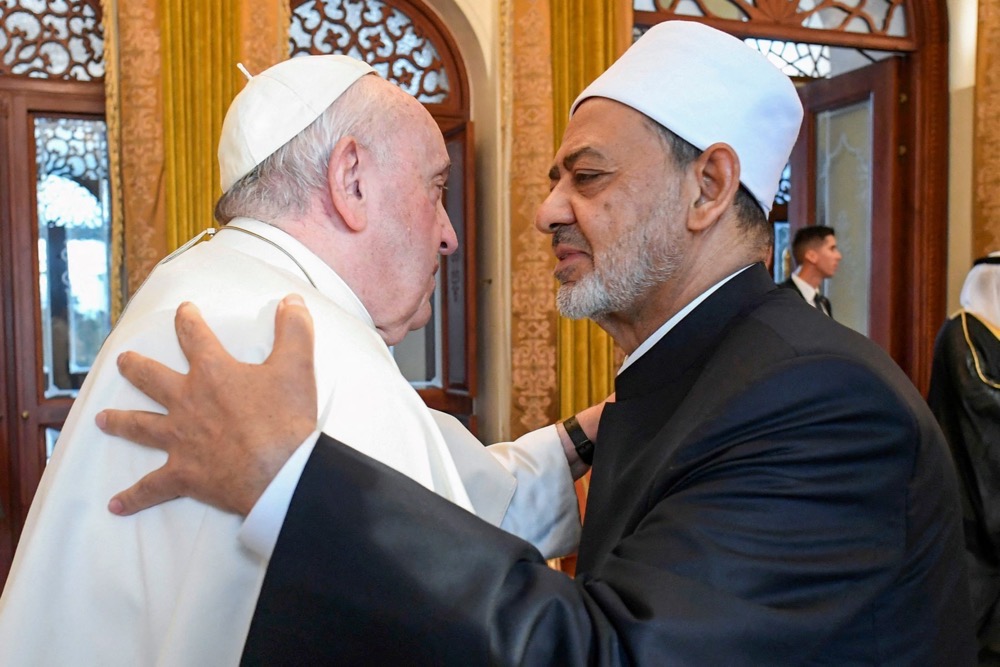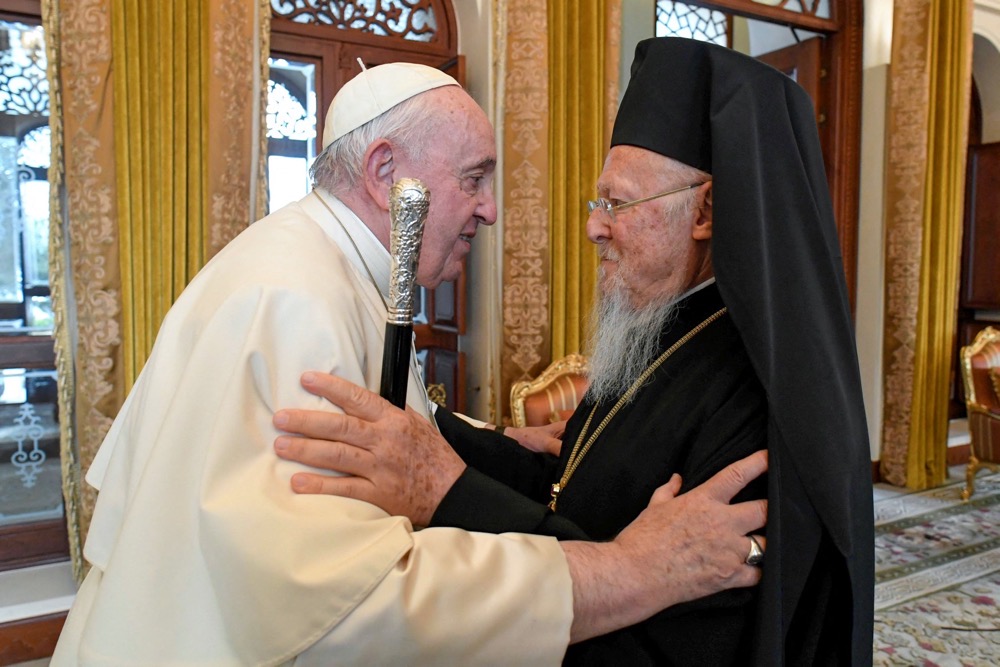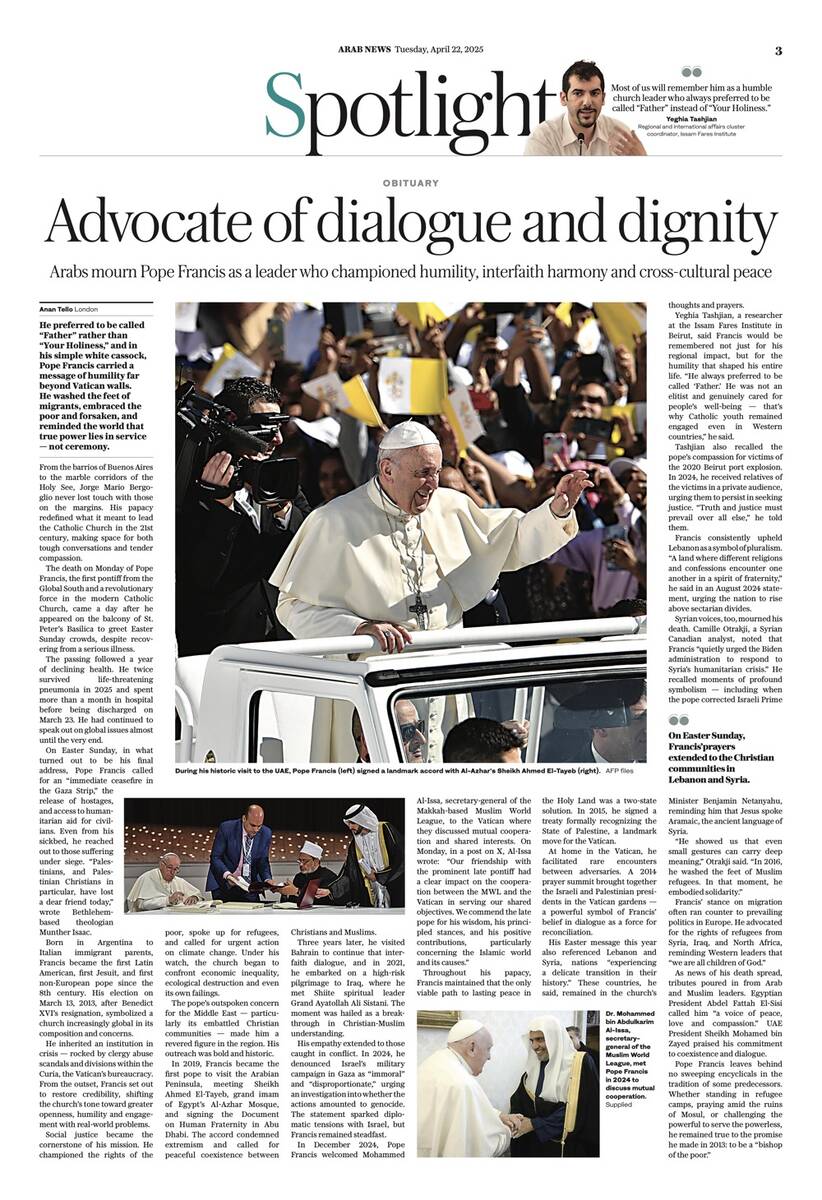LONDON: He preferred to be called “Father” rather than “Your Holiness,” and in his simple white cassock, Pope Francis carried a message of humility far beyond Vatican walls. He washed the feet of migrants, embraced the poor and forsaken, and reminded the world that true power lies in service — not ceremony.
From the barrios of Buenos Aires to the marble corridors of the Holy See, Jorge Mario Bergoglio never lost touch with those on the margins. His papacy redefined what it meant to lead the Catholic Church in the 21st century, making space for both tough conversations and tender compassion.
The death on Monday of Francis, the first pontiff from the Global South and a revolutionary force in the modern Catholic Church, came a day after he appeared on the balcony of St. Peter’s Basilica to greet Easter Sunday crowds, despite recovering from a serious illness.

Pope Francis with Al-Azhar’s Sheikh Ahmed El-Tayeb. (AFP/File)
The passing followed a year of declining health. He twice survived life-threatening pneumonia in 2025 and spent more than a month in hospital before being discharged on March 23. He had continued to speak out on global issues almost until the very end.
Elected on March 13, 2013, following Benedict XVI’s resignation, Francis inherited a church in crisis — from widespread clergy abuse scandals to infighting within the Curia, the Holy See’s administrative body.
He was chosen with a clear mandate to restore credibility and accountability, quickly shifting the church’s tone and priorities. His leadership marked a sharp break from his predecessor’s, steering the church toward greater openness, transparency and engagement with global issues.
As the first Latin American, first Jesuit, and first non-European Bishop of Rome since Syrian-born Gregory III in the 8th century, Francis’ rise from modest beginnings in Argentina symbolized a church increasingly reflective of its diverse global flock.
His background profoundly influenced his pastoral mission. Social justice became a cornerstone of his papacy, with a focus on the poor, refugees and marginalized groups.
“He taught us to live the values of the gospel with fidelity, courage and universal love, especially in favor of the poorest and most marginalized,” Cardinal Farrell said in his Monday statement.
Among the most distinctive aspects of Francis’ papacy was his engagement with the Middle East and the Arab world. His leadership was marked by historic outreach to both Muslim and Christian communities, with a persistent focus on peace and human dignity.

A worshipper prays following the news of the death of Pope Francis. (AFP)
In 2019, he made history as the first pope to visit the Arabian Gulf, traveling to the United Arab Emirates. He later visited Bahrain in 2022. Both trips highlighted his commitment to interfaith dialogue, religious freedom and peaceful coexistence, as he met with regional leaders and addressed human rights concerns.
During his visit to the UAE, the pope and Sheikh Ahmed El-Tayeb, grand imam of Egypt’s Al-Azhar Mosque, signed the “Document on Human Fraternity.” The agreement pledged a lasting partnership to reject violence and extremism.
Francis’ commitment to peace was further highlighted in 2021 with his historic pilgrimage to Iraq, where he met privately with Grand Ayatollah Ali Sistani, a leading figure in Shiite Islam. This visit marked a significant milestone in interfaith dialogue and reinforced Francis’ efforts for peace and reconciliation in the Middle East.
In December 2024, Francis welcomed Mohammed Al-Issa, secretary-general of the Makkah-based Muslim World League (MWL), to the Vatican, where they discussed mutual cooperation and shared interests.
While his public statements often drew both praise and criticism, they consistently reflected his defense of civilian life and dignity in conflict zones. This advocacy extended to his final days.
On the day before his passing, Francis dedicated part of his Easter message to Palestinians in war-torn Gaza. “I appeal once again,” he said, “for an immediate ceasefire in the Gaza Strip, for the release of the hostages … and for access to humanitarian aid.”
Munther Isaac, a Palestinian Christian theologian based in Bethlehem, expressed his sorrow over the pope’s death. “Palestinians, and Palestinian Christians in particular, have lost a dear friend today,” he wrote on X.

Pope Francis with the Ecumenical Patriarch of Constantinople Bartholomew I. ( Vatican Media/AFP)
He praised the late pope’s “true compassion to Palestinians, most notably to those in Gaza during this genocide,” highlighting his consistent outreach to “the Christian community besieged in Gaza on a constant basis, even from his hospital.”
His empathy extended to those caught in conflict. In 2024, he denounced Israel’s military campaign in Gaza as “immoral” and “disproportionate,” urging an investigation into whether the actions amounted to genocide. The statement sparked diplomatic tensions with Israel, but Francis remained steadfast.
UNRWA Commissioner-General Philippe Lazzarini also mourned the pope’s death, acknowledging his “constant” and “persistent” calls for a ceasefire and the release of hostages.
“His voice has contributed to draw the attention to the significant dehumanization of the war in Gaza (and) beyond,” Lazzarini wrote on X. “It was an honor to meet Pope Francis. Deeply grateful for his (and) the Holy See’s support to Palestine refugees (and) UNRWA.”
By consistently advocating for a two-state solution for Israelis and Palestinians, Francis left a legacy as a tireless voice for peace and human dignity, in the Arab world and beyond.
At the Vatican, Francis facilitated unprecedented encounters, including a 2014 prayer summit with Israeli and Palestinian leaders. This demonstrated his belief that dialogue and prayer could lay the foundations for lasting peace.
On Easter Sunday, his prayers extended to the Christian communities in Lebanon and Syria, countries “presently experiencing a delicate transition in their history.” He called on the church to “keep the Christians of the beloved Middle East in its thoughts and prayers.”
The death of Francis has been felt deeply across the region, where his leadership and compassion were revered by many.

A nun lights a candle next to a portrait of the late Pope Francis. (AFP)
Yeghia Tashjian, regional and international affairs cluster coordinator at the Issam Fares Institute for Public Policy and International Affairs at the American University of Beirut, told Arab News: “Pope Francis is often considered a great person by many because of his humility, compassion and focus on social justice.”
He added that the late pope’s humble approach was reflected not only in his title, but also in his actions. “I think most of us will remember him as a humble church leader who always preferred to be called ‘Father’ instead of ‘Your Holiness’,” Tashjian said. “I believe this should be an example to many church leaders in the East.
“Most importantly,” he added, “he was not an elitist and was always concerned for the well-being of the people; this is why in his era there was a strong commitment by the Catholic youth to the church, even in Western countries.”
In his reflections on Francis’ legacy, Tashjian also highlighted the Pope’s deep concern for Lebanon and the wider region. He said: “When it comes to Lebanon and the region, it was always in his prayers. He called for a ceasefire during the war and the end of the war in Gaza; he often criticized political leaders for their lack of commitment to peace.
“I think the Catholic world and the rest of the world will miss such a humble leader. I hope he will be an inspiration for religious leaders around the world,” Tashjian added.

Pope Francis signed a landmark accord with Al-Azhar’s Sheikh Ahmed El-Tayeb. (AFP/File)
Francis also showed concern for the suffering of Lebanese people after the Beirut port explosion, which killed at least 220 people and injured more than 6,000. In August 2024, he met 30 relatives of the blast’s victims in a private audience at the Vatican and expressed his support for their call for “truth and justice which have not yet arrived.
“All of us know that the issues are complex and difficult, and that opposing powers and interests make their influence felt,” he said. “Yet truth and justice must prevail over all else.”
Moroever, Francis consistently championed Lebanon as an example of religious pluralism and a beacon of peace. On Aug. 26, 2024, he reaffirmed Lebanon’s vocation “to be a land where diverse communities live together in concord, setting the common good above individual advantage; a land where different religions and confessions encounter one another in a spirit of fraternity.”
Syrians, too, feel the loss of Francis, seeing him as an advocate for their plight. Camille Otrakji, a Syrian Canadian analyst, told Arab News: “Behind the scenes, Pope Francis sought to ease the suffering of the Syrian people by quietly urging the Biden administration to acknowledge and respond to their prolonged humanitarian crisis.”
Otrakji also cited some of Francis’ powerful symbolic gestures that resonated deeply in the region. “In 2016, Pope Francis washed and kissed the feet of Muslim migrants, saying ‘we are all children of God’ — a powerful show of support for Syrian and Middle Eastern refugees in Europe.”

Dr. Mohammed bin Abdulkarim Al-Issa, secretary- general of the Muslim World League, met Pope Francis in 2024 to discuss mutual cooperation. (Supplied)
He highlighted other moments that resonated with regional Christians, including the pope’s correction of Israeli Prime Minister Benjamin Netanyahu’s claim that Jesus Christ spoke Hebrew. “Pope Francis reminded him that Jesus spoke Aramaic, a language that originated in the ancient region of Syria,” he said.
“In 2015, he signed a treaty that officially recognized Palestine as a state,” Otrakji added.
Arab and Muslim leaders offered their condolences following the Vatican’s announcement of Francis’ death.
On Monday, in a post on X, Al-Issa of the MWL wrote: “Our friendship with the prominent late pontiff had a clear impact on the cooperation between the MWL and the Vatican in serving our shared objectives.
“We commend the late pope for his wisdom, his principled stances, and his positive contributions, particularly concerning the Islamic world and its causes.”
Likewise, the Muslim Council of Elders, headed by Egypt’s Grand Imam Ahmed Al-Tayyeb, extended its condolences to “the leaders of the Catholic Church, our Christian brethren, and all advocates of peace and coexistence worldwide.”
The group released a statement on X, saying Francis “embodied a singular example of compassion and becoming a historic religious figure whose enduring humanitarian legacy will inspire future generations.”
Egyptian President Abdel Fattah El-Sisi also offered his condolences, describing Francis as “a voice of peace, love and compassion.”
UAE President Sheikh Mohamed bin Zayed extended his “deepest condolences to Catholics around the world,” writing on X that the pope “dedicated his life to promoting the principles of peaceful coexistence and understanding.”

A woman prays as she attends a vigil to honour Pope Francis. (AFP)
Lebanese President Joseph Aoun delivered a statement on the presidency’s X account, calling Francis’ death “a loss for all humanity, for he was a powerful voice for justice and peace” who called for “dialogue between religions and cultures.”
Jordan’s King Abdullah II, Turkish President Recep Tayyip Erdogan and Palestinian President Mahmoud Abbas also paid tribute to Francis.
In a statement to Arab News, Muath Alamri, director of the MWL, expressed “deep sorrow” at Francis’ death, calling him “a man of profound humility and wisdom.”
“On behalf of the MWL, I extend our heartfelt condolences to our Catholic friends around the world,” he said. “Pope Francis was a beacon of compassion and a strong advocate for justice and human dignity.”

From the barrios of Buenos Aires to the marble corridors of the Holy See, Jorge Mario Bergoglio never lost touch with those on the margins. (AFP)
Alamri praised the pope’s lifelong dedication to service and interfaith dialogue, saying he “will be remembered for his efforts to promote interfaith dialogue in the region and beyond.”
He added that the late pope’s “work to build bridges between communities, promoting harmony and peace among people of all faiths, was a testament to his noble character and his unwavering belief in the power of mutual understanding and cooperation.”
He leaves a legacy of peace, social justice and interfaith dialogue, profoundly impacting the Middle East and inspiring global communities with his commitment to humanity and reconciliation.
































